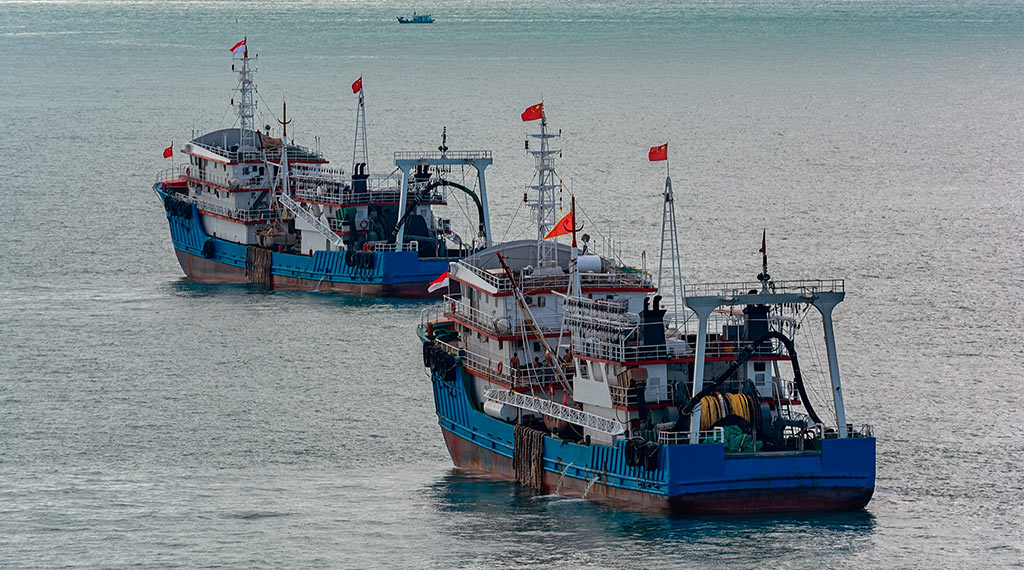China uses disguised fishing fleets to control Indo-Pacific, challenge US dominance in the region
By and

Editor’s Note: This piece by the Epoch Times is based off of an interview with CSP Senior Fellow, Grant Newsham.
China uses disguised fishing fleets in its efforts to gain control of the Indo-Pacific and challenge U.S. dominance in the region, according to veteran intelligence officer and author Grant Newsham.
The fleets, with their swarming tactics, double as a “maritime militia.”
“These are fishing boats. Sometimes they do fishing, but they’re also built [with] double hulls, up-engined. They have people with arms on them and [they] can use them to ram, to intimidate, and sink other vessels, particularly other fishing vessels,” Newsham recently told EpochTV’s “American Thought Leaders” program.
The tactic, he said, helps the communist regime to establish a long-term presence in various places and drive its opponents out.
“If you’re a fisherman, there’s no way you’re going to go in and challenge a big boat with a strong hull, a double hull, and guys with weapons on it, that is willing to ram and sink you and shoot you if necessary,” he said.
According to him, the tactic is part of the “gray-zone” warfare, which means the use of nontraditional methods and actors to achieve the goals of war, but without triggering an armed conflict.
An Aspect of Lawfare
If called out on the unorthodox strategy, China can argue that the aggressive vessels are just fishing boats, not naval vessels, making it difficult to come up with an effective or common-sense response, he noted.
“If the other guy knows that he can break the rules and elbow in on you and hurt you, and you’re not going to do anything, because it’s against the law, he’s going to take advantage of that. It’s almost an aspect of so-called lawfare, where the Chinese use international law to their advantage. Partly, it helps if they don’t obey it, and we do. You can see the advantage that it gives to the Chinese compared to us and others,” Newsham said.
He cited an August 2020 report in The Diplomat describing how China has routinely employed maritime militia fishing vessels over the past decade or so, backed by coast guard and naval forces, to encroach on Japan’s territorial sea surrounding the Senkaku Islands.
“In August 2016, some 230 Chinese fishing vessels swarmed the Senkaku Islands alongside Chinese Coast Guard (CCG) vessels. Eight fishing boats and CCG vessels repeatedly entered Japan’s territorial sea around the islands, while another 15 vessels repeatedly entered Japan’s contiguous zone,” the report said.
“The Chinese have done this now and then, and the purpose is to tell the Japanese, ‘Look, when the time comes we’re going to, they say, ‘assert administrative control,’ which is the legal term for asserting dominance of your territory. The Japanese are very worried about this,” Newsham noted.
In one incident in 2009, Chinese vessels, including fishing trawlers, harassed the U.S. ocean surveillance ship USNS Impeccable in the South China Sea.
Newsham believes this approach is more than just annoying. Beijing could use it to do direct harm to America.
“You can use these regular fishing boats, maritime militias to surreptitiously lay mines off of Japanese ports where the U.S. Navy operates. Cargo ships, for example, can launch drones that can cause the Americans a lot of trouble, say, as they’re sailing out of San Diego. These are things that we don’t think of as war-fighting, but it’s a wonderful platform and we should expect that we’re going to have to deal with it,” he said.
- US needs to integrate its allies and partners in Indo Pacific: Newsham - April 15, 2024
- Japan: Not well-prepared to work with a joint command - April 11, 2024
- NATO isn’t defending Guam, but others are - April 11, 2024
